Entrepreneurial Ventures: Scope, Traits, Characteristics and Mindset
VerifiedAdded on 2023/06/05
|9
|2525
|113
AI Summary
This report explores the scope of entrepreneurial ventures through examples, traits and characteristics associated with entrepreneurship, entrepreneurial mindset and its contribution to ventures. It also covers the impact of SMEs on the economy, importance of intrapreneurship and their differences. The report is relevant to subject Unit 9 ESBM and covers course code and name if mentioned along with college/university if mentioned.
Contribute Materials
Your contribution can guide someone’s learning journey. Share your
documents today.

Entrepreneurial Ventures
Secure Best Marks with AI Grader
Need help grading? Try our AI Grader for instant feedback on your assignments.
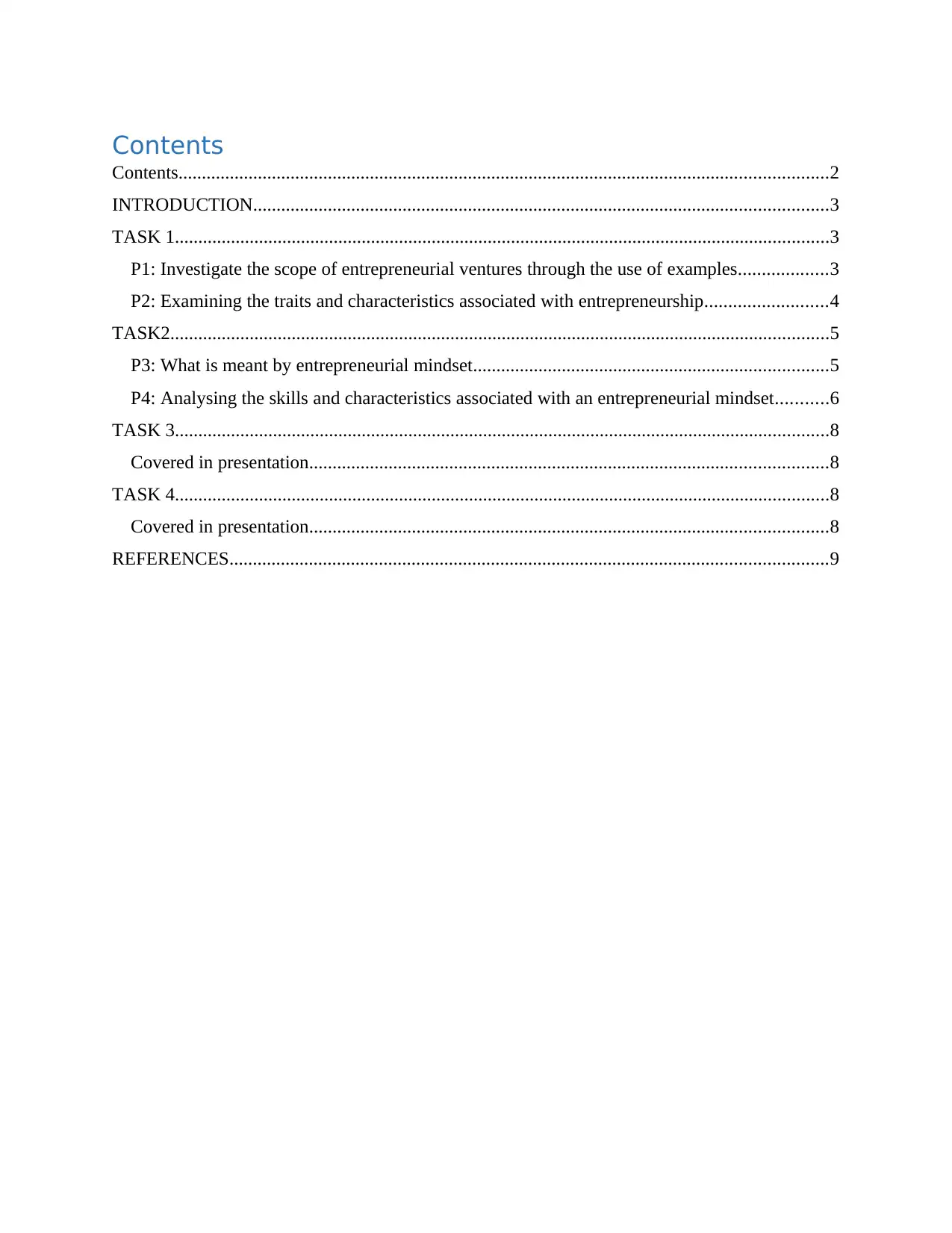
Contents
Contents...........................................................................................................................................2
INTRODUCTION...........................................................................................................................3
TASK 1............................................................................................................................................3
P1: Investigate the scope of entrepreneurial ventures through the use of examples...................3
P2: Examining the traits and characteristics associated with entrepreneurship..........................4
TASK2.............................................................................................................................................5
P3: What is meant by entrepreneurial mindset............................................................................5
P4: Analysing the skills and characteristics associated with an entrepreneurial mindset...........6
TASK 3............................................................................................................................................8
Covered in presentation...............................................................................................................8
TASK 4............................................................................................................................................8
Covered in presentation...............................................................................................................8
REFERENCES................................................................................................................................9
Contents...........................................................................................................................................2
INTRODUCTION...........................................................................................................................3
TASK 1............................................................................................................................................3
P1: Investigate the scope of entrepreneurial ventures through the use of examples...................3
P2: Examining the traits and characteristics associated with entrepreneurship..........................4
TASK2.............................................................................................................................................5
P3: What is meant by entrepreneurial mindset............................................................................5
P4: Analysing the skills and characteristics associated with an entrepreneurial mindset...........6
TASK 3............................................................................................................................................8
Covered in presentation...............................................................................................................8
TASK 4............................................................................................................................................8
Covered in presentation...............................................................................................................8
REFERENCES................................................................................................................................9
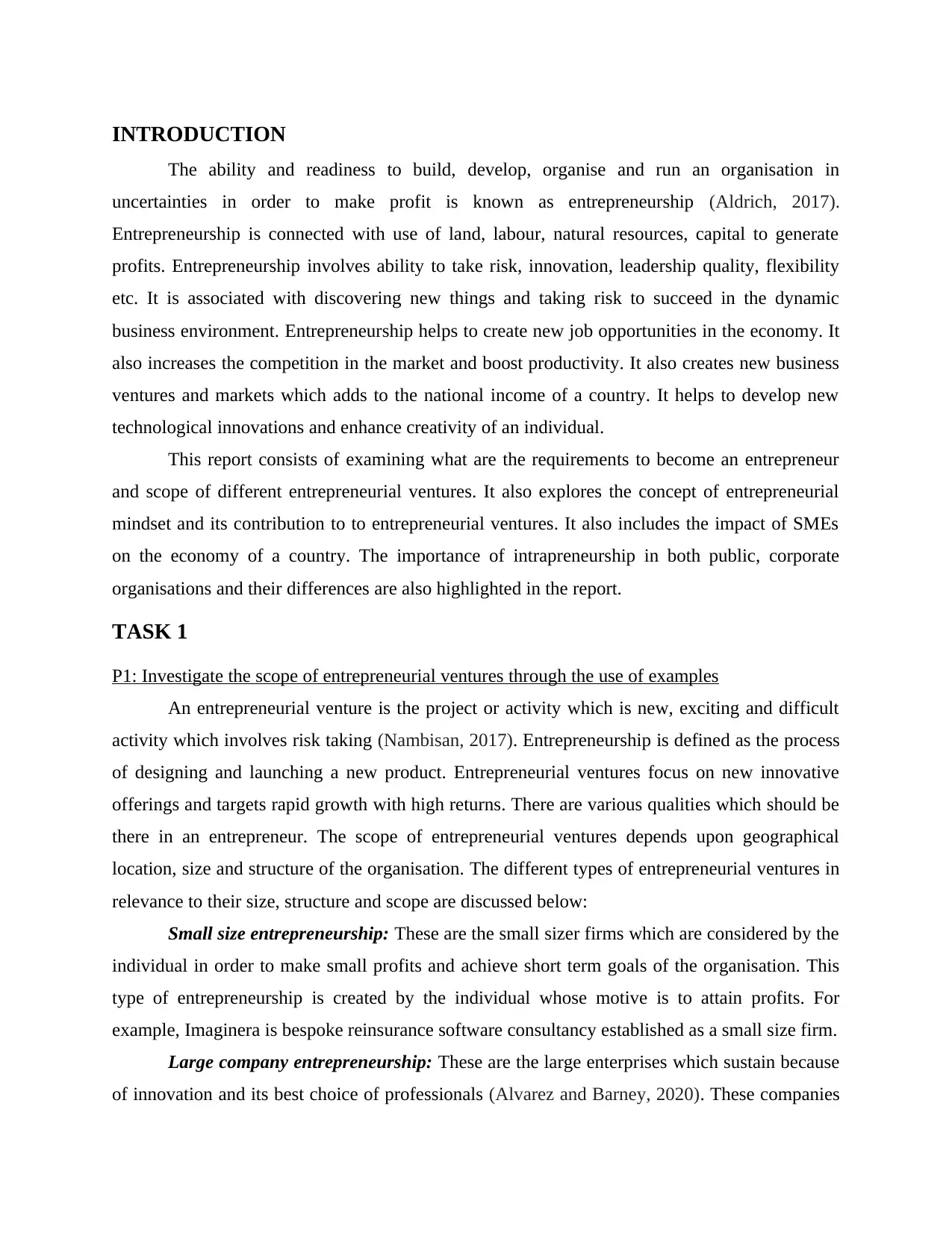
INTRODUCTION
The ability and readiness to build, develop, organise and run an organisation in
uncertainties in order to make profit is known as entrepreneurship (Aldrich, 2017).
Entrepreneurship is connected with use of land, labour, natural resources, capital to generate
profits. Entrepreneurship involves ability to take risk, innovation, leadership quality, flexibility
etc. It is associated with discovering new things and taking risk to succeed in the dynamic
business environment. Entrepreneurship helps to create new job opportunities in the economy. It
also increases the competition in the market and boost productivity. It also creates new business
ventures and markets which adds to the national income of a country. It helps to develop new
technological innovations and enhance creativity of an individual.
This report consists of examining what are the requirements to become an entrepreneur
and scope of different entrepreneurial ventures. It also explores the concept of entrepreneurial
mindset and its contribution to to entrepreneurial ventures. It also includes the impact of SMEs
on the economy of a country. The importance of intrapreneurship in both public, corporate
organisations and their differences are also highlighted in the report.
TASK 1
P1: Investigate the scope of entrepreneurial ventures through the use of examples
An entrepreneurial venture is the project or activity which is new, exciting and difficult
activity which involves risk taking (Nambisan, 2017). Entrepreneurship is defined as the process
of designing and launching a new product. Entrepreneurial ventures focus on new innovative
offerings and targets rapid growth with high returns. There are various qualities which should be
there in an entrepreneur. The scope of entrepreneurial ventures depends upon geographical
location, size and structure of the organisation. The different types of entrepreneurial ventures in
relevance to their size, structure and scope are discussed below:
Small size entrepreneurship: These are the small sizer firms which are considered by the
individual in order to make small profits and achieve short term goals of the organisation. This
type of entrepreneurship is created by the individual whose motive is to attain profits. For
example, Imaginera is bespoke reinsurance software consultancy established as a small size firm.
Large company entrepreneurship: These are the large enterprises which sustain because
of innovation and its best choice of professionals (Alvarez and Barney, 2020). These companies
The ability and readiness to build, develop, organise and run an organisation in
uncertainties in order to make profit is known as entrepreneurship (Aldrich, 2017).
Entrepreneurship is connected with use of land, labour, natural resources, capital to generate
profits. Entrepreneurship involves ability to take risk, innovation, leadership quality, flexibility
etc. It is associated with discovering new things and taking risk to succeed in the dynamic
business environment. Entrepreneurship helps to create new job opportunities in the economy. It
also increases the competition in the market and boost productivity. It also creates new business
ventures and markets which adds to the national income of a country. It helps to develop new
technological innovations and enhance creativity of an individual.
This report consists of examining what are the requirements to become an entrepreneur
and scope of different entrepreneurial ventures. It also explores the concept of entrepreneurial
mindset and its contribution to to entrepreneurial ventures. It also includes the impact of SMEs
on the economy of a country. The importance of intrapreneurship in both public, corporate
organisations and their differences are also highlighted in the report.
TASK 1
P1: Investigate the scope of entrepreneurial ventures through the use of examples
An entrepreneurial venture is the project or activity which is new, exciting and difficult
activity which involves risk taking (Nambisan, 2017). Entrepreneurship is defined as the process
of designing and launching a new product. Entrepreneurial ventures focus on new innovative
offerings and targets rapid growth with high returns. There are various qualities which should be
there in an entrepreneur. The scope of entrepreneurial ventures depends upon geographical
location, size and structure of the organisation. The different types of entrepreneurial ventures in
relevance to their size, structure and scope are discussed below:
Small size entrepreneurship: These are the small sizer firms which are considered by the
individual in order to make small profits and achieve short term goals of the organisation. This
type of entrepreneurship is created by the individual whose motive is to attain profits. For
example, Imaginera is bespoke reinsurance software consultancy established as a small size firm.
Large company entrepreneurship: These are the large enterprises which sustain because
of innovation and its best choice of professionals (Alvarez and Barney, 2020). These companies
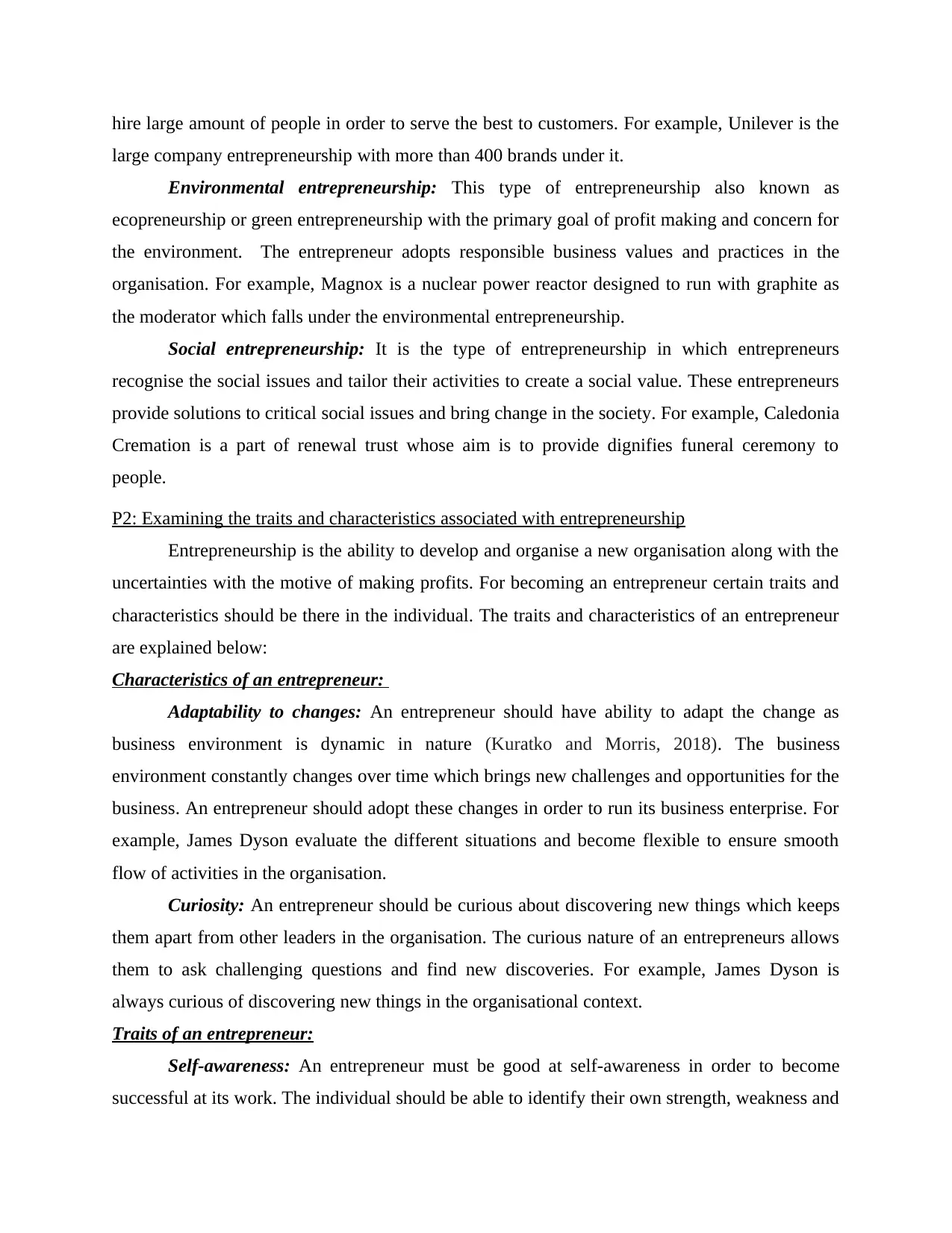
hire large amount of people in order to serve the best to customers. For example, Unilever is the
large company entrepreneurship with more than 400 brands under it.
Environmental entrepreneurship: This type of entrepreneurship also known as
ecopreneurship or green entrepreneurship with the primary goal of profit making and concern for
the environment. The entrepreneur adopts responsible business values and practices in the
organisation. For example, Magnox is a nuclear power reactor designed to run with graphite as
the moderator which falls under the environmental entrepreneurship.
Social entrepreneurship: It is the type of entrepreneurship in which entrepreneurs
recognise the social issues and tailor their activities to create a social value. These entrepreneurs
provide solutions to critical social issues and bring change in the society. For example, Caledonia
Cremation is a part of renewal trust whose aim is to provide dignifies funeral ceremony to
people.
P2: Examining the traits and characteristics associated with entrepreneurship
Entrepreneurship is the ability to develop and organise a new organisation along with the
uncertainties with the motive of making profits. For becoming an entrepreneur certain traits and
characteristics should be there in the individual. The traits and characteristics of an entrepreneur
are explained below:
Characteristics of an entrepreneur:
Adaptability to changes: An entrepreneur should have ability to adapt the change as
business environment is dynamic in nature (Kuratko and Morris, 2018). The business
environment constantly changes over time which brings new challenges and opportunities for the
business. An entrepreneur should adopt these changes in order to run its business enterprise. For
example, James Dyson evaluate the different situations and become flexible to ensure smooth
flow of activities in the organisation.
Curiosity: An entrepreneur should be curious about discovering new things which keeps
them apart from other leaders in the organisation. The curious nature of an entrepreneurs allows
them to ask challenging questions and find new discoveries. For example, James Dyson is
always curious of discovering new things in the organisational context.
Traits of an entrepreneur:
Self-awareness: An entrepreneur must be good at self-awareness in order to become
successful at its work. The individual should be able to identify their own strength, weakness and
large company entrepreneurship with more than 400 brands under it.
Environmental entrepreneurship: This type of entrepreneurship also known as
ecopreneurship or green entrepreneurship with the primary goal of profit making and concern for
the environment. The entrepreneur adopts responsible business values and practices in the
organisation. For example, Magnox is a nuclear power reactor designed to run with graphite as
the moderator which falls under the environmental entrepreneurship.
Social entrepreneurship: It is the type of entrepreneurship in which entrepreneurs
recognise the social issues and tailor their activities to create a social value. These entrepreneurs
provide solutions to critical social issues and bring change in the society. For example, Caledonia
Cremation is a part of renewal trust whose aim is to provide dignifies funeral ceremony to
people.
P2: Examining the traits and characteristics associated with entrepreneurship
Entrepreneurship is the ability to develop and organise a new organisation along with the
uncertainties with the motive of making profits. For becoming an entrepreneur certain traits and
characteristics should be there in the individual. The traits and characteristics of an entrepreneur
are explained below:
Characteristics of an entrepreneur:
Adaptability to changes: An entrepreneur should have ability to adapt the change as
business environment is dynamic in nature (Kuratko and Morris, 2018). The business
environment constantly changes over time which brings new challenges and opportunities for the
business. An entrepreneur should adopt these changes in order to run its business enterprise. For
example, James Dyson evaluate the different situations and become flexible to ensure smooth
flow of activities in the organisation.
Curiosity: An entrepreneur should be curious about discovering new things which keeps
them apart from other leaders in the organisation. The curious nature of an entrepreneurs allows
them to ask challenging questions and find new discoveries. For example, James Dyson is
always curious of discovering new things in the organisational context.
Traits of an entrepreneur:
Self-awareness: An entrepreneur must be good at self-awareness in order to become
successful at its work. The individual should be able to identify their own strength, weakness and
Secure Best Marks with AI Grader
Need help grading? Try our AI Grader for instant feedback on your assignments.
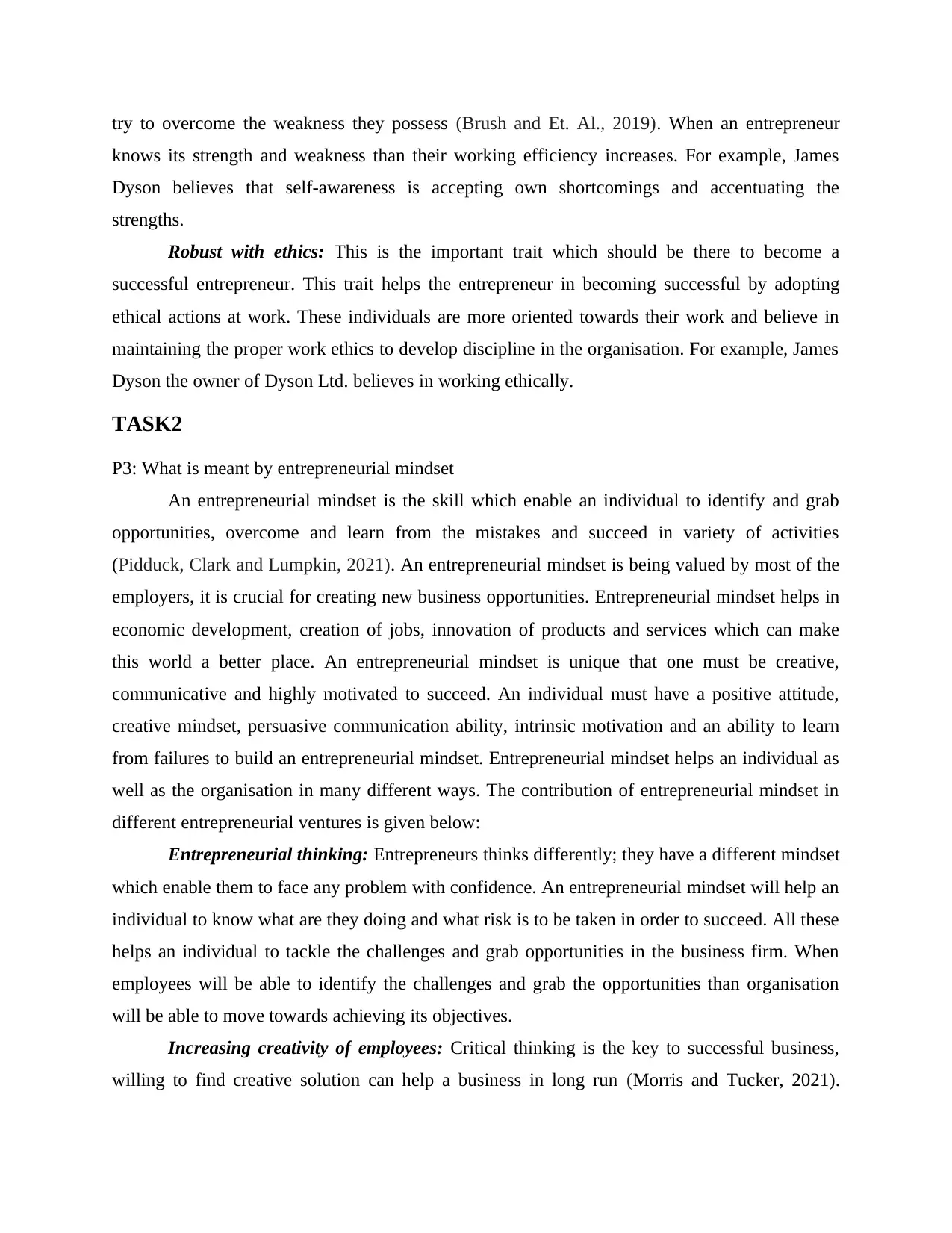
try to overcome the weakness they possess (Brush and Et. Al., 2019). When an entrepreneur
knows its strength and weakness than their working efficiency increases. For example, James
Dyson believes that self-awareness is accepting own shortcomings and accentuating the
strengths.
Robust with ethics: This is the important trait which should be there to become a
successful entrepreneur. This trait helps the entrepreneur in becoming successful by adopting
ethical actions at work. These individuals are more oriented towards their work and believe in
maintaining the proper work ethics to develop discipline in the organisation. For example, James
Dyson the owner of Dyson Ltd. believes in working ethically.
TASK2
P3: What is meant by entrepreneurial mindset
An entrepreneurial mindset is the skill which enable an individual to identify and grab
opportunities, overcome and learn from the mistakes and succeed in variety of activities
(Pidduck, Clark and Lumpkin, 2021). An entrepreneurial mindset is being valued by most of the
employers, it is crucial for creating new business opportunities. Entrepreneurial mindset helps in
economic development, creation of jobs, innovation of products and services which can make
this world a better place. An entrepreneurial mindset is unique that one must be creative,
communicative and highly motivated to succeed. An individual must have a positive attitude,
creative mindset, persuasive communication ability, intrinsic motivation and an ability to learn
from failures to build an entrepreneurial mindset. Entrepreneurial mindset helps an individual as
well as the organisation in many different ways. The contribution of entrepreneurial mindset in
different entrepreneurial ventures is given below:
Entrepreneurial thinking: Entrepreneurs thinks differently; they have a different mindset
which enable them to face any problem with confidence. An entrepreneurial mindset will help an
individual to know what are they doing and what risk is to be taken in order to succeed. All these
helps an individual to tackle the challenges and grab opportunities in the business firm. When
employees will be able to identify the challenges and grab the opportunities than organisation
will be able to move towards achieving its objectives.
Increasing creativity of employees: Critical thinking is the key to successful business,
willing to find creative solution can help a business in long run (Morris and Tucker, 2021).
knows its strength and weakness than their working efficiency increases. For example, James
Dyson believes that self-awareness is accepting own shortcomings and accentuating the
strengths.
Robust with ethics: This is the important trait which should be there to become a
successful entrepreneur. This trait helps the entrepreneur in becoming successful by adopting
ethical actions at work. These individuals are more oriented towards their work and believe in
maintaining the proper work ethics to develop discipline in the organisation. For example, James
Dyson the owner of Dyson Ltd. believes in working ethically.
TASK2
P3: What is meant by entrepreneurial mindset
An entrepreneurial mindset is the skill which enable an individual to identify and grab
opportunities, overcome and learn from the mistakes and succeed in variety of activities
(Pidduck, Clark and Lumpkin, 2021). An entrepreneurial mindset is being valued by most of the
employers, it is crucial for creating new business opportunities. Entrepreneurial mindset helps in
economic development, creation of jobs, innovation of products and services which can make
this world a better place. An entrepreneurial mindset is unique that one must be creative,
communicative and highly motivated to succeed. An individual must have a positive attitude,
creative mindset, persuasive communication ability, intrinsic motivation and an ability to learn
from failures to build an entrepreneurial mindset. Entrepreneurial mindset helps an individual as
well as the organisation in many different ways. The contribution of entrepreneurial mindset in
different entrepreneurial ventures is given below:
Entrepreneurial thinking: Entrepreneurs thinks differently; they have a different mindset
which enable them to face any problem with confidence. An entrepreneurial mindset will help an
individual to know what are they doing and what risk is to be taken in order to succeed. All these
helps an individual to tackle the challenges and grab opportunities in the business firm. When
employees will be able to identify the challenges and grab the opportunities than organisation
will be able to move towards achieving its objectives.
Increasing creativity of employees: Critical thinking is the key to successful business,
willing to find creative solution can help a business in long run (Morris and Tucker, 2021).
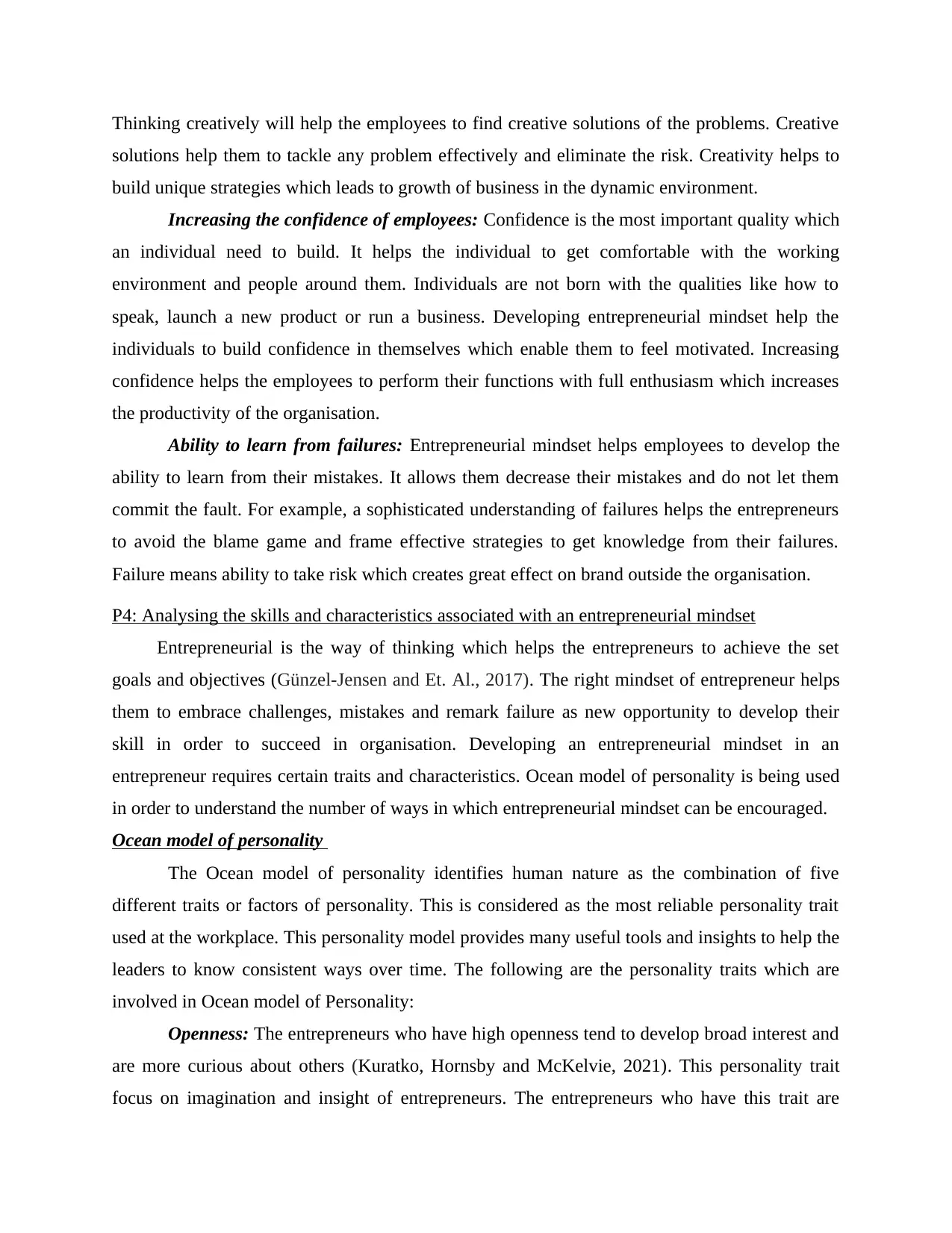
Thinking creatively will help the employees to find creative solutions of the problems. Creative
solutions help them to tackle any problem effectively and eliminate the risk. Creativity helps to
build unique strategies which leads to growth of business in the dynamic environment.
Increasing the confidence of employees: Confidence is the most important quality which
an individual need to build. It helps the individual to get comfortable with the working
environment and people around them. Individuals are not born with the qualities like how to
speak, launch a new product or run a business. Developing entrepreneurial mindset help the
individuals to build confidence in themselves which enable them to feel motivated. Increasing
confidence helps the employees to perform their functions with full enthusiasm which increases
the productivity of the organisation.
Ability to learn from failures: Entrepreneurial mindset helps employees to develop the
ability to learn from their mistakes. It allows them decrease their mistakes and do not let them
commit the fault. For example, a sophisticated understanding of failures helps the entrepreneurs
to avoid the blame game and frame effective strategies to get knowledge from their failures.
Failure means ability to take risk which creates great effect on brand outside the organisation.
P4: Analysing the skills and characteristics associated with an entrepreneurial mindset
Entrepreneurial is the way of thinking which helps the entrepreneurs to achieve the set
goals and objectives (Günzel-Jensen and Et. Al., 2017). The right mindset of entrepreneur helps
them to embrace challenges, mistakes and remark failure as new opportunity to develop their
skill in order to succeed in organisation. Developing an entrepreneurial mindset in an
entrepreneur requires certain traits and characteristics. Ocean model of personality is being used
in order to understand the number of ways in which entrepreneurial mindset can be encouraged.
Ocean model of personality
The Ocean model of personality identifies human nature as the combination of five
different traits or factors of personality. This is considered as the most reliable personality trait
used at the workplace. This personality model provides many useful tools and insights to help the
leaders to know consistent ways over time. The following are the personality traits which are
involved in Ocean model of Personality:
Openness: The entrepreneurs who have high openness tend to develop broad interest and
are more curious about others (Kuratko, Hornsby and McKelvie, 2021). This personality trait
focus on imagination and insight of entrepreneurs. The entrepreneurs who have this trait are
solutions help them to tackle any problem effectively and eliminate the risk. Creativity helps to
build unique strategies which leads to growth of business in the dynamic environment.
Increasing the confidence of employees: Confidence is the most important quality which
an individual need to build. It helps the individual to get comfortable with the working
environment and people around them. Individuals are not born with the qualities like how to
speak, launch a new product or run a business. Developing entrepreneurial mindset help the
individuals to build confidence in themselves which enable them to feel motivated. Increasing
confidence helps the employees to perform their functions with full enthusiasm which increases
the productivity of the organisation.
Ability to learn from failures: Entrepreneurial mindset helps employees to develop the
ability to learn from their mistakes. It allows them decrease their mistakes and do not let them
commit the fault. For example, a sophisticated understanding of failures helps the entrepreneurs
to avoid the blame game and frame effective strategies to get knowledge from their failures.
Failure means ability to take risk which creates great effect on brand outside the organisation.
P4: Analysing the skills and characteristics associated with an entrepreneurial mindset
Entrepreneurial is the way of thinking which helps the entrepreneurs to achieve the set
goals and objectives (Günzel-Jensen and Et. Al., 2017). The right mindset of entrepreneur helps
them to embrace challenges, mistakes and remark failure as new opportunity to develop their
skill in order to succeed in organisation. Developing an entrepreneurial mindset in an
entrepreneur requires certain traits and characteristics. Ocean model of personality is being used
in order to understand the number of ways in which entrepreneurial mindset can be encouraged.
Ocean model of personality
The Ocean model of personality identifies human nature as the combination of five
different traits or factors of personality. This is considered as the most reliable personality trait
used at the workplace. This personality model provides many useful tools and insights to help the
leaders to know consistent ways over time. The following are the personality traits which are
involved in Ocean model of Personality:
Openness: The entrepreneurs who have high openness tend to develop broad interest and
are more curious about others (Kuratko, Hornsby and McKelvie, 2021). This personality trait
focus on imagination and insight of entrepreneurs. The entrepreneurs who have this trait are
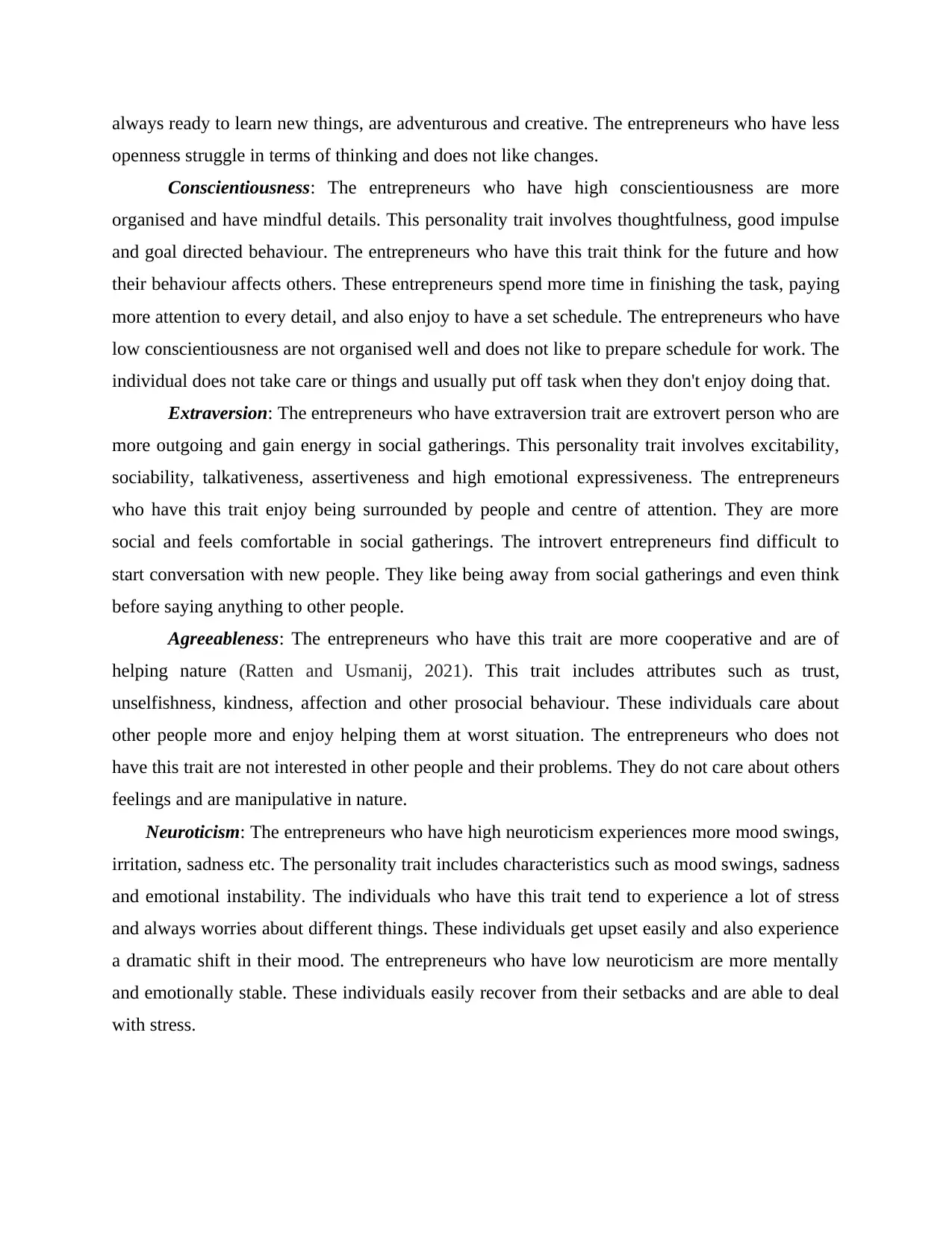
always ready to learn new things, are adventurous and creative. The entrepreneurs who have less
openness struggle in terms of thinking and does not like changes.
Conscientiousness: The entrepreneurs who have high conscientiousness are more
organised and have mindful details. This personality trait involves thoughtfulness, good impulse
and goal directed behaviour. The entrepreneurs who have this trait think for the future and how
their behaviour affects others. These entrepreneurs spend more time in finishing the task, paying
more attention to every detail, and also enjoy to have a set schedule. The entrepreneurs who have
low conscientiousness are not organised well and does not like to prepare schedule for work. The
individual does not take care or things and usually put off task when they don't enjoy doing that.
Extraversion: The entrepreneurs who have extraversion trait are extrovert person who are
more outgoing and gain energy in social gatherings. This personality trait involves excitability,
sociability, talkativeness, assertiveness and high emotional expressiveness. The entrepreneurs
who have this trait enjoy being surrounded by people and centre of attention. They are more
social and feels comfortable in social gatherings. The introvert entrepreneurs find difficult to
start conversation with new people. They like being away from social gatherings and even think
before saying anything to other people.
Agreeableness: The entrepreneurs who have this trait are more cooperative and are of
helping nature (Ratten and Usmanij, 2021). This trait includes attributes such as trust,
unselfishness, kindness, affection and other prosocial behaviour. These individuals care about
other people more and enjoy helping them at worst situation. The entrepreneurs who does not
have this trait are not interested in other people and their problems. They do not care about others
feelings and are manipulative in nature.
Neuroticism: The entrepreneurs who have high neuroticism experiences more mood swings,
irritation, sadness etc. The personality trait includes characteristics such as mood swings, sadness
and emotional instability. The individuals who have this trait tend to experience a lot of stress
and always worries about different things. These individuals get upset easily and also experience
a dramatic shift in their mood. The entrepreneurs who have low neuroticism are more mentally
and emotionally stable. These individuals easily recover from their setbacks and are able to deal
with stress.
openness struggle in terms of thinking and does not like changes.
Conscientiousness: The entrepreneurs who have high conscientiousness are more
organised and have mindful details. This personality trait involves thoughtfulness, good impulse
and goal directed behaviour. The entrepreneurs who have this trait think for the future and how
their behaviour affects others. These entrepreneurs spend more time in finishing the task, paying
more attention to every detail, and also enjoy to have a set schedule. The entrepreneurs who have
low conscientiousness are not organised well and does not like to prepare schedule for work. The
individual does not take care or things and usually put off task when they don't enjoy doing that.
Extraversion: The entrepreneurs who have extraversion trait are extrovert person who are
more outgoing and gain energy in social gatherings. This personality trait involves excitability,
sociability, talkativeness, assertiveness and high emotional expressiveness. The entrepreneurs
who have this trait enjoy being surrounded by people and centre of attention. They are more
social and feels comfortable in social gatherings. The introvert entrepreneurs find difficult to
start conversation with new people. They like being away from social gatherings and even think
before saying anything to other people.
Agreeableness: The entrepreneurs who have this trait are more cooperative and are of
helping nature (Ratten and Usmanij, 2021). This trait includes attributes such as trust,
unselfishness, kindness, affection and other prosocial behaviour. These individuals care about
other people more and enjoy helping them at worst situation. The entrepreneurs who does not
have this trait are not interested in other people and their problems. They do not care about others
feelings and are manipulative in nature.
Neuroticism: The entrepreneurs who have high neuroticism experiences more mood swings,
irritation, sadness etc. The personality trait includes characteristics such as mood swings, sadness
and emotional instability. The individuals who have this trait tend to experience a lot of stress
and always worries about different things. These individuals get upset easily and also experience
a dramatic shift in their mood. The entrepreneurs who have low neuroticism are more mentally
and emotionally stable. These individuals easily recover from their setbacks and are able to deal
with stress.
Paraphrase This Document
Need a fresh take? Get an instant paraphrase of this document with our AI Paraphraser

TASK 3
Covered in presentation
TASK 4
Covered in presentation
Covered in presentation
TASK 4
Covered in presentation
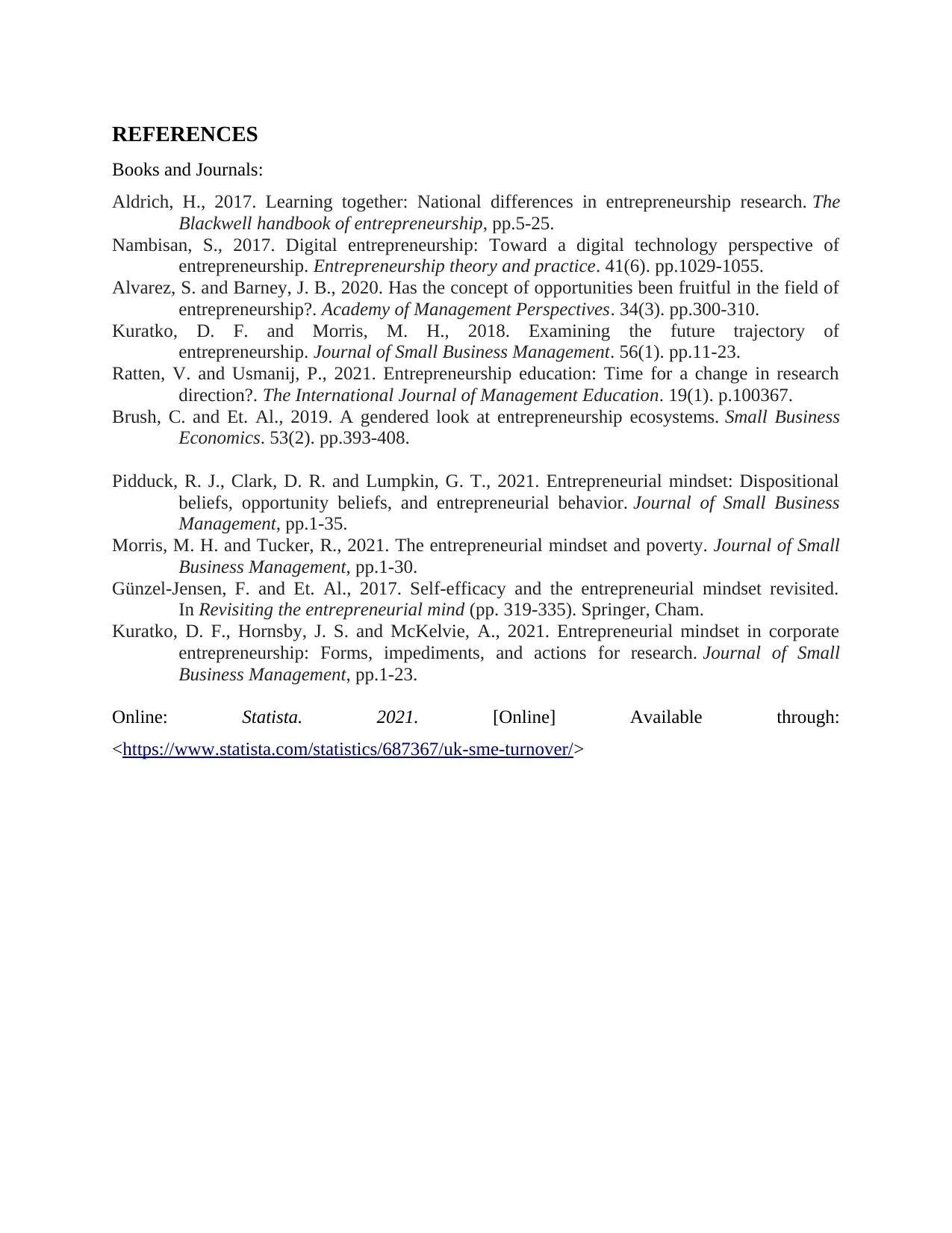
REFERENCES
Books and Journals:
Aldrich, H., 2017. Learning together: National differences in entrepreneurship research. The
Blackwell handbook of entrepreneurship, pp.5-25.
Nambisan, S., 2017. Digital entrepreneurship: Toward a digital technology perspective of
entrepreneurship. Entrepreneurship theory and practice. 41(6). pp.1029-1055.
Alvarez, S. and Barney, J. B., 2020. Has the concept of opportunities been fruitful in the field of
entrepreneurship?. Academy of Management Perspectives. 34(3). pp.300-310.
Kuratko, D. F. and Morris, M. H., 2018. Examining the future trajectory of
entrepreneurship. Journal of Small Business Management. 56(1). pp.11-23.
Ratten, V. and Usmanij, P., 2021. Entrepreneurship education: Time for a change in research
direction?. The International Journal of Management Education. 19(1). p.100367.
Brush, C. and Et. Al., 2019. A gendered look at entrepreneurship ecosystems. Small Business
Economics. 53(2). pp.393-408.
Pidduck, R. J., Clark, D. R. and Lumpkin, G. T., 2021. Entrepreneurial mindset: Dispositional
beliefs, opportunity beliefs, and entrepreneurial behavior. Journal of Small Business
Management, pp.1-35.
Morris, M. H. and Tucker, R., 2021. The entrepreneurial mindset and poverty. Journal of Small
Business Management, pp.1-30.
Günzel-Jensen, F. and Et. Al., 2017. Self-efficacy and the entrepreneurial mindset revisited.
In Revisiting the entrepreneurial mind (pp. 319-335). Springer, Cham.
Kuratko, D. F., Hornsby, J. S. and McKelvie, A., 2021. Entrepreneurial mindset in corporate
entrepreneurship: Forms, impediments, and actions for research. Journal of Small
Business Management, pp.1-23.
Online: Statista. 2021. [Online] Available through:
<https://www.statista.com/statistics/687367/uk-sme-turnover/>
Books and Journals:
Aldrich, H., 2017. Learning together: National differences in entrepreneurship research. The
Blackwell handbook of entrepreneurship, pp.5-25.
Nambisan, S., 2017. Digital entrepreneurship: Toward a digital technology perspective of
entrepreneurship. Entrepreneurship theory and practice. 41(6). pp.1029-1055.
Alvarez, S. and Barney, J. B., 2020. Has the concept of opportunities been fruitful in the field of
entrepreneurship?. Academy of Management Perspectives. 34(3). pp.300-310.
Kuratko, D. F. and Morris, M. H., 2018. Examining the future trajectory of
entrepreneurship. Journal of Small Business Management. 56(1). pp.11-23.
Ratten, V. and Usmanij, P., 2021. Entrepreneurship education: Time for a change in research
direction?. The International Journal of Management Education. 19(1). p.100367.
Brush, C. and Et. Al., 2019. A gendered look at entrepreneurship ecosystems. Small Business
Economics. 53(2). pp.393-408.
Pidduck, R. J., Clark, D. R. and Lumpkin, G. T., 2021. Entrepreneurial mindset: Dispositional
beliefs, opportunity beliefs, and entrepreneurial behavior. Journal of Small Business
Management, pp.1-35.
Morris, M. H. and Tucker, R., 2021. The entrepreneurial mindset and poverty. Journal of Small
Business Management, pp.1-30.
Günzel-Jensen, F. and Et. Al., 2017. Self-efficacy and the entrepreneurial mindset revisited.
In Revisiting the entrepreneurial mind (pp. 319-335). Springer, Cham.
Kuratko, D. F., Hornsby, J. S. and McKelvie, A., 2021. Entrepreneurial mindset in corporate
entrepreneurship: Forms, impediments, and actions for research. Journal of Small
Business Management, pp.1-23.
Online: Statista. 2021. [Online] Available through:
<https://www.statista.com/statistics/687367/uk-sme-turnover/>
1 out of 9
Related Documents
Your All-in-One AI-Powered Toolkit for Academic Success.
+13062052269
info@desklib.com
Available 24*7 on WhatsApp / Email
![[object Object]](/_next/static/media/star-bottom.7253800d.svg)
Unlock your academic potential
© 2024 | Zucol Services PVT LTD | All rights reserved.
